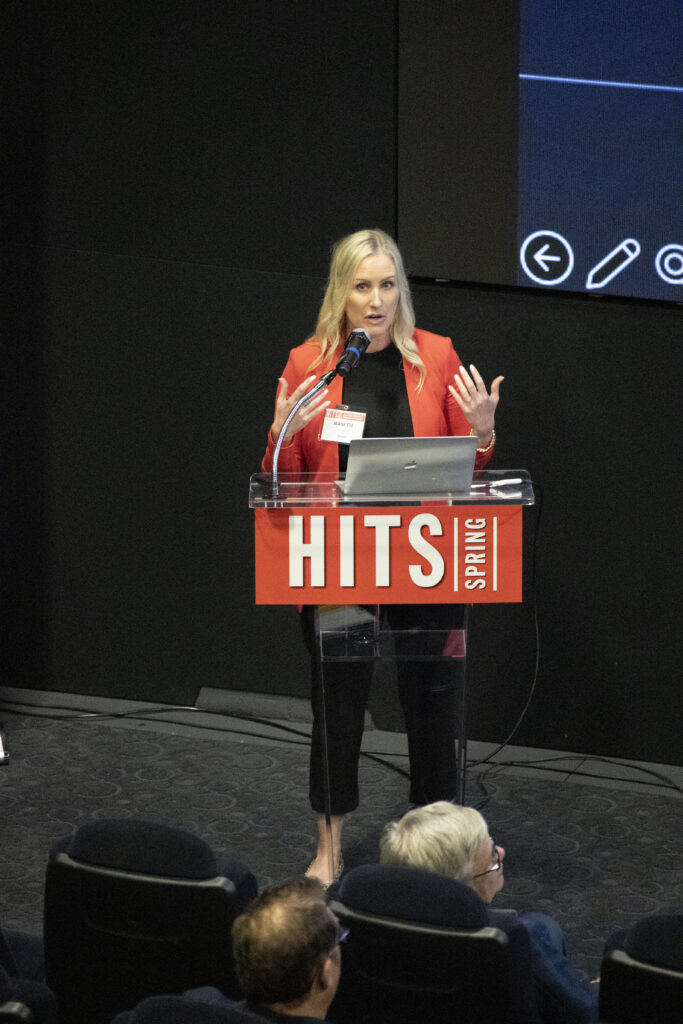M+E Daily

HITS 2023: Veritone Explores How AI Can Boost Content Capabilities
Story Highlights
As demand for content has reached an all-time high and resources are strapped, media and entertainment organizations need to think very fast: create quickly, discover quickly and monetize now, according to Jeanette Kadow, regional sales director, West for Veritone.
Modern (artificial intelligence) AI gives media organizations the ability to accomplish that by supercharging content production, she said May 23 at the Hollywood Innovation and Transformation Summit (HITS) at The Culver Theater, during the session “Boosting Your Content Capabilities (and Your Bottom Line) with AI.”
Organizations can index and find archival content to use and reuse with automated metadata tagging. They can also create new assets from existing ones using tools including generative AI and AI voice. And then companies can monetize that content with AI-powered marketplaces and licensing capabilities.
Attendees learned how AI is unlocking more content, more revenue and greater efficiency than ever before for leading media and entertainment organizations globally.
“This is definitely the topic of conversation, which is great for me because I’ve been in this business, the AI business, for nine years and have met with many of you, even as soon as five years ago, and nobody thought this was real,” Kadow recalled with a laugh.
“It’s exciting to not only talk with my peers about AI but watch our customers really leverage this in everyday workflows,” she told attendees, adding: “Today we’re going to be talking about boosting your content capabilities and your bottom line with AI.”
 At Veritone, she said: “We really try to be your trusted wilderness guide for AI. What Veritone did was we essentially created the world’s first operating system for artificial intelligence…. We are leveraging all of today’s best in breed AI models into one ecosystem, one operating system and, whether that is models from certainly the big titans like Amazon or Microsoft or Google, etc. we have some of our own models plus hundreds of others that are really kind of trained at business use cases for our partners just to really harness the power of AI for their business specific use case. And while you can certainly leverage AI from a bunch of different providers, the beauty of the operating system is it really future proofs our customers’ businesses because as AI is changing every single day in this case, and those models are becoming faster, more efficient, more accurate, more cost efficient, we are able to kind easily snap and snap out our AI models so that our customers are always having access to the best in best in breed today and tomorrow. And so that is kind of our secret sauce.”
At Veritone, she said: “We really try to be your trusted wilderness guide for AI. What Veritone did was we essentially created the world’s first operating system for artificial intelligence…. We are leveraging all of today’s best in breed AI models into one ecosystem, one operating system and, whether that is models from certainly the big titans like Amazon or Microsoft or Google, etc. we have some of our own models plus hundreds of others that are really kind of trained at business use cases for our partners just to really harness the power of AI for their business specific use case. And while you can certainly leverage AI from a bunch of different providers, the beauty of the operating system is it really future proofs our customers’ businesses because as AI is changing every single day in this case, and those models are becoming faster, more efficient, more accurate, more cost efficient, we are able to kind easily snap and snap out our AI models so that our customers are always having access to the best in best in breed today and tomorrow. And so that is kind of our secret sauce.”
She focuses on entertainment and works with the Hollywood studios, many broadcasters, sports teams, brands, content owners, but “we are also in legal and state and local law enforcement,” the government cloud, different use cases but “still tapping into the power of AI,” she pointed out.
Veritone tries to “empower leaders in media and broadcast, and we are really leading them into this new world of AI…. We are essentially helping people accelerate their content journey and that journey kind of starts with create and then manage and monetize and then innovate. So obviously, when I was at NAB, monetize was, I would say, the second largest topic of conversation next to gen AI.”
However, “if you look at” the market as “kind of like these four buckets, you’re using and leveraging AI to really help you create new media, create synthetic media to help grow and engage your audiences and then how to manage that media,” she said.
Veritone offers solutions and services she said were designed to help organizations “tap into the power of the AI but then manage it in a pain of glass that’s easily searchable,” makes it easy to share, to download, to permission, to extend all in the cloud. “And then certainly some monetization capabilities because now … you can easily find things,” which presents a “new monetization opportunity.”
Shifting to generative AI and voice cloning, he said: “We really look at these as just another kind of two models or model categories that’s in our operating system. So today we have over 300-plus AI models on the operating system … that ranges from facial recognition to head detection, to transcription, translation, onscreen text recognition, object recognition, real-time transcription…. We’ve just basically onboarded these other two categories for synthetic voice and gen AI.”
Those are tools designed to help organizations “create new synthetic content,” she said, adding: “If we talk a little bit about synthetic voice, which I don’t know if anybody is super familiar with.… That’s essentially the ability to clone voice. So I can go on the internet today and clone my voice in a minute when there’s a hundred different websites that’ll do that.”
But she was quick to add: “That’s not what we’re talking about here today. This is really an enterprise grade voice solution that is production quality [and] managed from end to end.”
Intellectual property must be managed and “there are a lot of ethics practices that go into managing that IP,” she noted.
She went on to say: “That’s kind of our promise for good. But essentially we have models that will clone and create a custom voice into a synthetic voice. And then we have services around that that allow you to manage that, to access it, to host it, to control it. And then we’re really kind of your partner in all of that.”
To view the presentation, click here.
The Hollywood Innovation and Transformation Summit event was produced by MESA in association with the Hollywood IT Society (HITS) and presented by Amazon Studios Technology, with sponsorship by Fortinet, Genpact, Prime Focus Technologies, Signiant, Softtek, Convergent, Gracenote, Altman Solon, AppTek, Ascendion, CoreSite, EPAM, MicroStrategy, Veritone, CDSA, EIDR and PDG Consulting.









